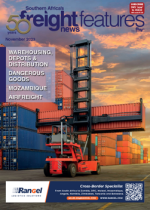Ongoing blackouts are exacting a heavy toll on the warehousing sector, driving up costs and disrupting operations.Martin Bailey, CEO of Industrial Logistic Systems (ILS), points out that the nation's energy crisis has forced warehouse owners to make substantial investments in large-scale solar installations and generators, driving operational costs to unprecedented levels."We're witnessing a staggering annual expenditure, ranging from R30 to R40 million for individual companies, solely to maintain the functionality of their warehouses and distribution centres. Although the adoption of solar solutions in warehousing has become increasingly prevalent, the continued reliance on generators persists, resulting in inefficient power usage that incurs significant c os t s."Bailey said given the growing pressure on companies to embrace greener solutions, the warehousing sector frequently found itself caught between a rock and a hard place. "The supply chain is making efforts, and we're witnessing more sustainability initiatives. However, with the surging e-commerce demand it's challenging, given that we're handling items one at a time. There's undeniably increased pressure on companies to improve, but in South Africa, the persistent energy crisis makes this task nearly insurmountable. Warehouses are adopting solar solutions not primarily for sustainability but out of necessity to ensure the continuity of their operations."Logistics centres, warehouses, depots, and distribution centres worldwide are increasingly exploring green building solutions, as the imperative to reduce carbon footprints continues to gain momentum."Changing consumer behaviours and their heightened demands have emerged as the catalysts behind automation. The contemporary consumer craves a greater quantity and swifter delivery of products, sparking a revolution in our industry. C onsequently, the demand for warehousing persists, driven by the need for additional space to accommodate the surging volumes of products, diverse product lines, and increased deliveries. This trend is particularly pronounced in South Africa, where the majority of consumer goods are imported."While some warehouses in South Africa have begun to adopt automation and are keeping trend with international developments, many continue to lag behind their global counterparts. According to Bailey, this disparity can be attributed to a two-fold rationale: firstly, the steep cost of importing automated solutions for warehouses, owing to unfavourable exchange rates, and secondly, the ongoing affordability of labour within the country."Our projection for South Africa suggests that we may not witness the same degree of automation on the warehouse f loor as seen in other nations, where automatic mobile robots are gaining widespread popularity. Instead, we anticipate that the real automation revolution in our warehouse space will occur on the administrative front, with AI playing a pivotal role in enhancing planning, tracking, tracing, and improving customer interfaces.He said that the level of automation adopted by a warehouse was highly contingent on the type of products it handled. “In South Africa, there are isolated instances of automation. In certain sectors, automation is imperative to maintain competitive efficiency and meet demand.”
Investments in solar installations and generators driving up costs
13 Nov 2023 - by -
0 Comments
November 2023 Compendium

13 Nov 2023
13 Nov 2023
13 Nov 2023
13 Nov 2023
13 Nov 2023
13 Nov 2023
13 Nov 2023
13 Nov 2023
